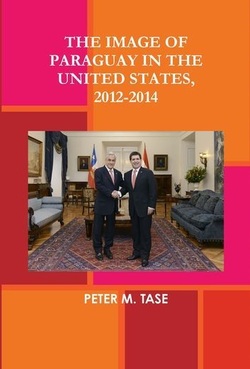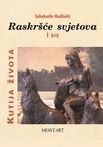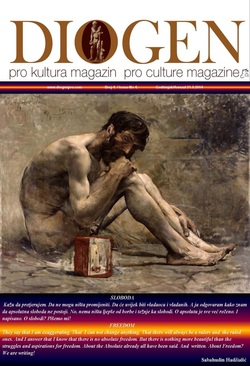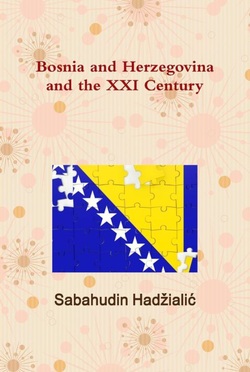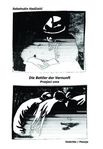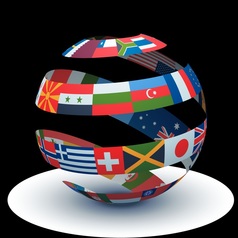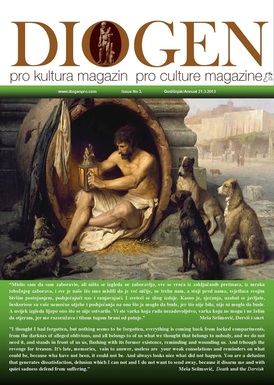|
NA LISTI Od 04.8.2010.g. /
LISTED SINCE August 4th, 2010 among leading European magazines: |
All Rights Reserved
Publishers and owners: Peter Tase and Sabahudin Hadžialić, Whitefish Bay, WI, United States of America MI OBJEDINJUJEMO RAZLIČITOSTI... WE ARE UNIFYING DIVERSITIES |
Narudžba knjiga / Purchasing of the books / Bücher bestellen
TRANSLATION AS THE GATE OF INTERACTION TOWARDS OTHER CULTURES
PREVOĐENJE KAO KAPIJA INTERAKCIJE PREMA DRUGIM KULTURAMA
Samira Begman Karabeg, Zurich, Switzerland
05.04.2013.
|
Literarno prevođenje[1]
kao medijator umjetnosti jezika Rođena sam i odrasla u bivšoj Jugoslaviji, dok blizu dvije trećine života živim i radim u Švicarskoj. Svoju predodžbu svijeta i misaone forme izražavam kroz književna djela na oba jezika. Za vrijeme jednog književnog nastupa u Švicarskoj, jedan od slušalaca me upitao kada pišem na jednom a kada na drugom jeziku, odnosno, da li postoji tenzija za određeni jezik proizašla iz samog sadržaja djela? Nisam imala odgovor na ovo pitanje, ali, kada sam kasnije pažljivo analizirala svoja djela primijetila sam da postoji uočljiva ovisnost o sadržaju, odnosno, o predodžbi svijeta i jeziku. Sadržaji sa predodžbama svijeta iz emotivnog, osjećajnog, služili su se BHS, odnosno slavenskim jezikom, dok su sadržaji sa predodžbama svijeta iz misaonog, duhovnog išli su ka njemačkom, odnosno germanskom jezikom. Ova sadržajno-jezična vezanost se ne svodi samo na mentalno-psihički sklop mene kao individue s obzirom da sam prvu fazu života, u kojoj je osjećajnost pokretačka snaga, stvaranja predodžbi svijeta, proživjela u Jugoslaviji modelirajući te predodžbe BHS jezikom. Zrelu životnu dob sam, u kojoj u poimanju svijeta prevladava misaono, duhovno, provela u Švicarskoj i služila se njemačkim jezikom. Već se ta sadržajno jezična vezanost zasniva uglavnom na samom jeziku. Njemački jezik jeste jezik filozofije i duhovnosti dok su slavenski jezici više jezici osjećajnosti i emotivnosti. Mentalitet ljudi i jezik ljudi se međusobno uvjetuju i nadgrađuju. Ova zakonitost se nedvosmisleno potvrđuje jezikom muzike - gotovo svi slavenski kompozitori klasične muzike su komponovali u molu - tonalitet osjećajnosti, dok svi germanski kompozitori u duru - tonalitet kojim muzika ispoljava duhovnost. Bio je to jedan sasvim prirodni poticaj da sam se, za različite predodžbe svijeta služila njima shodno različitim jezicima. Na jednom daljnjem stepenu svoga književnog stvaralaštva počela sam se baviti prevođenjem, u oba pravca. Na ovom stepenu, pararelno sa prevođenjem analitički sam iščitavala prevedenu poeziju u usporedbi sa originalom. Uočila sam da je vrlo malo slavenskih pjesnika prevedeno na njemački jezik. Primjera radi, jedan u slavenskom govornom području kultni pjesnik, Sergej Jesenjin, je u njemačkom govornom području posve nepoznat. Pominje se tek samo kao muž primabalerine Isidore Dankan. U samom prevodilačkom radu uočila sam da se u procesu prevođenja ne mijenjaju samo riječi i redosljed sintaksi, već i u djelo implicirani simboli, predodžbe svijeta. Jezik na kojem je jedno književno djelo nastalo, determinira prvenstveno filozofski osmišljeni, a u procesu estetiziranja osmišljenog, i njegov oformljeni svijet. Prenijeti književno djelo u jedan drugi jezik znači determinante jezika tako manipulirati da na kraju nastane, sadržajno i estetski, nešto istovjetno. Ova manipulacija determinata se odvija na dva nivoa: lingvistički - gramatičke strukture koje deformiraju smisao u odnosu na originalni tekst, te literarno - filozofske posljedice jezične transformacije djela uzrokovane nejednakostima jezičnih sistema. S jedne strane, tu su promjene smisla nastale usljed promjene roda imenica i s druge strane, upotreba vremenskih struktura jezika. Jer da se u njemačkom jeziku rod imenice određuje članom a u BHS jezicima završnicom, proizlazi iz gramatičke osobenosti jezika. O tome ne ovisi samo poimanje već i simbolika prevedenog fragmenta djela. Uzmimo, primjera radi, riječ "most". Na njemačkom jeziku most (die Brücke) je ženski rod, na BHS muški. Šta se dešava u procesu jezičnog preobražaja ove riječi? Kao prvo, mijenja se simbolika koja stoji iza same riječi. Promjena roda ne vodi samo jednoj drugoj psihoanalitičkoj klasifikaciji simbola već i jednoj drugoj jezičnoj, etnološkoj i kulturno-historijskoj vezi. Nijemce most asocira na nešto elegantno i harmonizirajuće, dok južne Slavene na nešto povezujuće, opasno, ali i istovremeno razdvajajuće. Osjećajnost iz koje proizlaze ovakve asocijacije kod južnih Slavena rezultirana je kompleksnom i kompliciranom historijom obrađenom u književnim djelima ili narativnom predanju kao što je "Na Drini ćuprija" Ive Andrića ili bugarska narodna pjesma o uzidavanju žive žene u most kao simbol žrtve za nastajanje nečeg novog. Iskusni prevodilac zna da smisao jedne riječi ne mora neizostavno u različitim jezicima biti identičan. Za lingviste razlika je u gramatičkim pravilima, dok je za filozofe i književnike u simbolici, odnosno, u predodžbi o svijetu koju ta riječ evocira, naročito kad su u pitanju riječi sa jednom filozofski ključnom funkcijom u djelu. Prevodilac književnog djela ima za zadatak da prevede jednu predodžbu o svijetu a ta predodžba je ovisna o impliciranom jeziku. Njemački kritičar i filozof Martin Heidegger[2] kaže: "Književno djelo je uvijek jedno BITI unutar vremena, njegova egzistencija se realizira i objašnjava u vremenskim kategorijama, jednom smišljeno, ono opstaje kao konstantno umjetničko djelo u odnosu na vrijeme, ne mijenja se s njim". Nasuprot tome, jedno prevedeno djelo ne pripada kategoriji BITI već postojati i postajati. Ono je uvijek kopija originala, a ona nije bezvremenska. Naprimjer, prijevodi Göthea se ne razlikuju samo od originala autora, već i jedan od drugoga. Jer kopija se smije i treba usavršavati, original nikada. Georg Steiner[3] u svom djelu "Nach Babel[4]" tvrdi da se svaki ljudski jezik prema svijetu otvara na sebi svojstven način. Prevedeno djelo, dakle, otvara svijet originalnog djela na način svojstven svom jeziku. Jer književnost danas nije, kao u 19 i 20 stoljeću, medium koji utječe na kolektivnu svijest političke i ekonomske klase, već se u svijetu moderne komunikacije ona sve više koncentrira na očuvanje svijesti. Ovo očuvanje svijesti se, kao bezvremenski nosilac vrijednosti književnosti, prevođenjem reproducira u različite jezike i kulture. Ako književno prevođenje promatramo u ovom kontekstu, postaje jasno koju značajnu ulogu ono ima. Iz tog razloga, književnom prevođenju se, kao jednoj disciplini umjetnosti, te prevodiocu, kao medijatoru kultura, pridaje sve veća pozornost. Ali, na žalost, ne u svim jezicima i svim kulturama podjednako. Mada u Europi ne postoje tačni statistički podaci o zastupljenosti prevedene literature među jezicima i kulturama, očigledno je, da prijevodi sa engleskog jezika sačinjavaju oko 60 % svih prevedenih knjiga, sa francuskog oko 10 % te sa njemačkog oko 7 %, čime ova tri izvorna jezika sačinjavaju 4/5 svih prevedenih knjiga u Europi. Nasuprot tome, samo mali broj knjiga sa drugih izvornih jezika se prevodi na ove dominantne jezike. Jedan od bitnih razloga ovog debalansa je taj da izdavači nastoje prvenstveno otkupiti prava na prijevode djela nastalih u dominantnim jezicima. Polazeći od činjenice da se književnost danas sve više koncentrira na očuvanje svijesti unutar jedne kulture, književnom prevođenju možemo prilaziti sa aspekta proširenja svijesti i kulturnog horizonta. Time i kulture sve manje poimamo kao homogene, zatvorene entitete, već kao otvorene sisteme nastale na razmjeni koji se međusobno konstituiraju i transformiraju, te pristup kulturi unutar nacionalnih granica stavlja u dispoziciju. A time i interkulturalnosti, jer ona pretpostavlja razmjenu između autohtonih, homogenih koncepata. U ovoj oblasti posebno je interesantna teorija filozofa Homi Bhaba.[5] Bhaba ne polazi od toga da su kulture u biti homogene, ili, njegovim pojmom rečeno, hibridne, jer u međusobnom prožimanju od centra i periferije on vidi jednu presudnu dinamiku koja se suprostavlja hijerarhijskoj ukrućenosti i centriranosti. Ovaj prostor međusobnog utjecaja Bhaba naziva "third space". Istovremeno, on upozorava da se ovaj treći prostor ne otvara tek tako, već je on arena procesa društvenih utjecaja na pojmove i definicije. Pri analizi o zastupljenosti prevođene literature među jezicima uvidjeli smo da ovaj utjecaj nije podjednak. Otvaranje trećeg prostora, dakle, slijedi samo kroz procese razmjene između stranog i vlastitog, iz čega proizlazi promjena perspektive. Jer tek kada se zauzme jedna druga pozicija, vlastita se može reflektirati. Ta promjena perspektive je proces prevođenja i sam prevodilac se poima kao jedan čvor jezika i lingvističkih sistema. Multikulturalnost se sa teritorijalne koncepcije prenosi na osobnu. Prevodilac nije samo medijator umjetnosti jezika, već prije svega jedna bikulturalna osoba. Tek bikulturalnost prevodioca je u stanju da posreduje između dvije kulture koje ne posjeduju puno zajedničkog. Uzmimo na primjer južnoslavenske frazeologizme i njihovi ekvivalenti u njemačkom jeziku. Velikoj većini ovih frazeologizama ne odgovara ni jedan njemački frazeološki ekvivalent i za njihov prijenos u njemački jezik potrebno je poslužiti se ili jednim drugim motiviranim frazeologizmom ili jednom perifrazom. Neprevodivost ovih frazeologizama leži u divergenci između južnoslavenskih jezika i njemačkog jezika nastaloj na kulturno-specifičnoj osobenosti. Jedna bikulturalna osoba je u permanentnom procesu prevazilaženja ove divergence. ------------------------------ [1] Prevod je isuviše gruba riječ i preferiram upotrebu riječi „prepjev“ tako da kada navodim „prevod“ ili „prevođenja“ upravo mislim na „prepjev“ , jer sa svakim novim prevodom, pjesma i/ili prozni tekst dobija kvalitet više, postaje čak i novo djelo, zavisno od razumijevanja načina prevođenja, odnosno prepjevavanja. [2] Sein und Zeit, Niemeyer Verlag, Tübingen 1963 [3] Nach Babel, Aspekt der Sprache und des Übersetzens, Surkamp Verlag 1994 [4] poslije Babela [5] Die Verortung der Kultur, Tübingen 2000 |
Literally translation[1]
as mediator of the art of language I was born and raised in the former Yugoslavia, while nearly two thirds of life I live and work in Switzerland. My own conception of the world and patterns of thoughts I expresses through literary creations in both languages. During one of the literary performances in Switzerland, one of the listeners asked me when I write on one and when on the other language, in other words, whether there is a tension for the specific language derived from the content of the creation? I had no answer to this question, but when I later carefully analyzed my own creations I noticed that there is a noticeable dependence on the content, in other words, the conception of the world and language. Contents with imaginings of the emotional, affectionate, used the BCS, or Slavic language, while contents with ideas from the world of thoughts, spiritual were going to German or Germanic language. This substantially and linguistic ties are not limited to mental and psychological circuit of me as an individual since I, in first stage of life, in which the sensibility are the driving force, creating the conception of the world, lived in Yugoslavia modeling these conceptions with BCS language. During mature age, in which the intellectually, spiritually are predominant worldview, spend in Switzerland and used German language. Already that linguistic content is based mainly on the language. German is the language of philosophy and spirituality while the Slavic languages are more languages of sensitivity and emotionality. Mentality of the people and the language are mutually conditioned and upgraded. This legitimacy in unequivocal way confirms with the language of music - almost all Slavic composers of classical music have composed in a minor key - the mode of sensitivity, while all the major German composers did it in major key - music that expresses the mode of spirituality. It was an entirely natural impulse that I, for different conceptions of the world serve them according to different languages. On one further stage of his literary work I started translating in both directions. At this stage, parallel with translating analytic showed us I translated poetry in comparison to the original. I noticed that very few Slavic poets have been translated into German. For example, one of the Slavic-speaking cult poet Sergei Yesenin, in the German-speaking world is completely unknown. Just mentioned as husband of prima ballerina Isadora Duncan. In the work of translation, I noticed that in the process of translation is not only changing the order of words and syntax, but also symbols implied in the creation, of the conception of word. The language in which a creation is made, determines primarily philosophical thought out, and in the process of the aesthetisation of designed, his formed world. Transfer the literary creation in another language means that you should manipulate determinants of the language so that, eventually, occurs, trough the content and aesthetic way, something identical. This manipulation of determinants takes place two levels: linguistic - grammatical structures that deform the meaning in the relation to the original text, and literature way - philosophical consequences of linguistic transformation of the creation caused by inequalities of the linguistic systems. On the one hand, those changes of the meanings that occurred because of changes in gender nouns and on the other hand, the use of temporal structure of the language. Because it is in the German language that gender is determined by a noun and in BCS langugaes with finals, and it is derived from the grammatical features of the languages. About this depends not only understanding but also the symbolism of the translated fragment of the creations. Take, for example, the word "bridge". In German Bridge (Die Brücke) is feminine, but in the BCS language is masculine. What happens in the process of linguistic transformation of this word? First, the symbolism behind the word is chaning. Changing of gender does not only lead to another psychoanalytic classification of symbol but also towards another language, ethnological and culture-historical relationship. „The bridge“ resembles Germans on something elegant and harmonizing, while South Slaves on something binding, dangerous, but at the same time separating. Sensitivity arising from such associations at South Slavs is resulted because a complex and complicated history treated in literary or narrative tradition, such as the "The Bridge on Drina" by Ivo Andric or Bulgarian folk poem about a live woman erected in a bridge as a symbol of the sacrifice for the arising of something new. Experienced translator knows that the meaning of one word does not have to necessarily be identical within different languages. Difference for linguists is in grammatical rules, while for the philosophers and writers is in the symbolism, and in other words, in the notion of the world that the word evokes, especially when it comes to words with one key philosophy function in the creation. Translator of literary creation has the task to convert an image of the world and this image is dependent on the implied language. German critic and philosopher Martin Heidegger[2] says: "The literary work is still only one to BE within the time, its existence is realized and explained within the categories of time, and once conceived, it survives as a constant work of art in relation to time, does not change with it." In contrast, a translated creation does not belong to the category „to BE“ but to the category of becoming existing. It is always a copy of the original, and it is not timeless. For example, translations of Göthea does not differ only from the original of the author, but also from one to another. Because the copy is and should be improved, but original creation - never. George Steiner[3] in his "Nach Babel[4]" argues that every human language opens up to the world in his own unique way. Translated creation, therefore, opens up a world of original creation in a manner characteristic of its own language. Because literature today is not, as in the 19 and 20 century, medium influencing the collective consciousness of the political and economic classes, but in the world of modern communications, it is increasingly concentrated on the preservation of consciousness. This preservation of consciousness, as a holder of timeless literature, translating reproduces in different languages and cultures. If we look at literary translation in this context, it becomes clear that it has a significant role. For this reason, for the literary translation, as one discipline of the art, and the translator as mediator of cultures, is given increasing attention. But, unfortunately, not in all languages and all cultures equally. Although in Europe there are no accurate statistics on representation of translates literature between languages and cultures, it is obvious that the translations from the English language makes up about 60% of all translated books, with about 10% from the French and German with about 7%, which the three native languages make up 4/5 of all translated books in Europe. In contrast, only a small number of books from other native languages are translated into the dominant languages. One important reason for this imbalance is that publishers are trying to buy in the rights for the translation of creations made in the dominant languages. Starting from the fact that literature has been increasingly focused today on the preservation of consciousness within one culture, literary translation can be approached in terms of expansion of consciousness and cultural horizons. Through that the cultures itself are seen as less homogeneous, closed entities, but as open systems arising on exchange and are mutually constituted and transformed, and that puts access to culture within national borders into disposition. By that even intercultural, because it presupposes the exchange between indigenous, homogeneous concepts. In this area is, in particular, an interesting theory of the philosopher Homi Bhaba[5]. Bhaba does not start from the fact that cultures are essentially homogeneous, or, within his notion said, hybrid, because within the mutual pervadetion from the center and the periphery, he sees a decisive dynamics which is opposed to the hierarchical stiffness and centeredness. This area of interaction Bhaba calls the "third space". At the same time, he warns that this third space does not open easily, but is a arena of the processes of social influences on concepts and definitions. In analyzing the representation of translated literature between languages we realized that this impact is not equal. The opening of the third area, therefore, only follows through exchange processes between foreign and own, from which results the change in perspective. Because, only when you take the other position, it can reflect your own. This shift in perspective is the process of translation and the translator is conceived as a single node of languages and linguistic systems. Multiculturalism is carried over from the territorial concept to the personal. The translator is not just a mediator of the art of language, but above all one bicultural person. Only bi-culturality of the translator is able to mediate between the two cultures that does not have much in common. Take the example of South Slav phraseologisms and their equivalents in the German language. The vast majority of these is not adequate any of phrases in a German equivalent and for transfer to the German language must be used with one or the other or one motivated phraseologisms or one periphrasis. Untranslatability of these phraseologisms lies in the divergence between the South Slavic languages and German made up on cultural-sepcific peculiarity. One bicultural person is in a permanent process of overcoming this divergence. ----------------------- [1] Translation is too harsh word, and I prefer the use of the word "rendition" so that when I quote "translation" or "translating" I think on the "rendering" because with each new translation the poem and /or prose text gets the more quality , it becomes even a new creation, depending on the understanding of the way of translation, in other words rendetion. [2] Sein und Zeit, Niemeyer Verlag, Tübingen 1963 [3] Nach Babel, Aspect der Sprache und des Übersetzens, Surkamp Verlag 1994 [4] after Babel [5] Die Kultur der Verortung, Tübingen 2000 Translation from BHS language in English by Sabahudin Hadzialic |
| literarno_prevodjenje_kao_medijator_umjetnosti_jezika_samira_begman_karabeg.doc | |
| File Size: | 394 kb |
| File Type: | doc |
| literarno_prevodjenje_kao_medijator_umjetnosti_jezika_samira_begman_karabeg.pdf | |
| File Size: | 180 kb |
| File Type: | |
| literally_translation_as_mediator_of_the_art_of_language_samira_begman_karabeg.doc | |
| File Size: | 387 kb |
| File Type: | doc |
| literally_translation_as_mediator_of_the_art_of_language_samira_begman_karabeg.pdf | |
| File Size: | 141 kb |
| File Type: | |
.
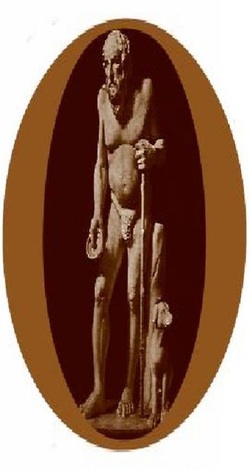
Copyright © 2015 Peter Tase & Sabahudin Hadžialić
Design: Sabi / Autors & Sabahudin Hadžialić. Design LOGO - Stevo Basara.
Freelance gl. i odg. urednik od / Freelance Editor in chief as of 2009: Sabahudin Hadžialić
All Rights Reserved. Publishers and owners: Peter Tase & Sabahudin Hadžialić
Whitefish Bay, WI, United States of America
Diogen pro kultura magazin (Online)
ISSN 2296-0929
Diogen pro kultura magazin (Print)
ISSN 2296-0937
Library of Congress USA / Biblioteka - Knjižnica Kongresa SAD
Contact Editorial board E-mail: [email protected];
Narudžbe/Order: http://www.diogenpro.com/diogen-all-in-one.html
Pošta/Mail USA: Peter Tase, 5023 NORTH BERKELEY BLVD. WHITEFISH BAY, WI, 53217, USA
Pošta/Mail BiH: Sabahudin Hadžialić, Grbavička 32, 71000 Sarajevo i/ili Dr. Wagner 18/II, 70230 Bugojno, Bosna i Hercegovina
Design: Sabi / Autors & Sabahudin Hadžialić. Design LOGO - Stevo Basara.
Freelance gl. i odg. urednik od / Freelance Editor in chief as of 2009: Sabahudin Hadžialić
All Rights Reserved. Publishers and owners: Peter Tase & Sabahudin Hadžialić
Whitefish Bay, WI, United States of America
Diogen pro kultura magazin (Online)
ISSN 2296-0929
Diogen pro kultura magazin (Print)
ISSN 2296-0937
Library of Congress USA / Biblioteka - Knjižnica Kongresa SAD
Contact Editorial board E-mail: [email protected];
Narudžbe/Order: http://www.diogenpro.com/diogen-all-in-one.html
Pošta/Mail USA: Peter Tase, 5023 NORTH BERKELEY BLVD. WHITEFISH BAY, WI, 53217, USA
Pošta/Mail BiH: Sabahudin Hadžialić, Grbavička 32, 71000 Sarajevo i/ili Dr. Wagner 18/II, 70230 Bugojno, Bosna i Hercegovina




